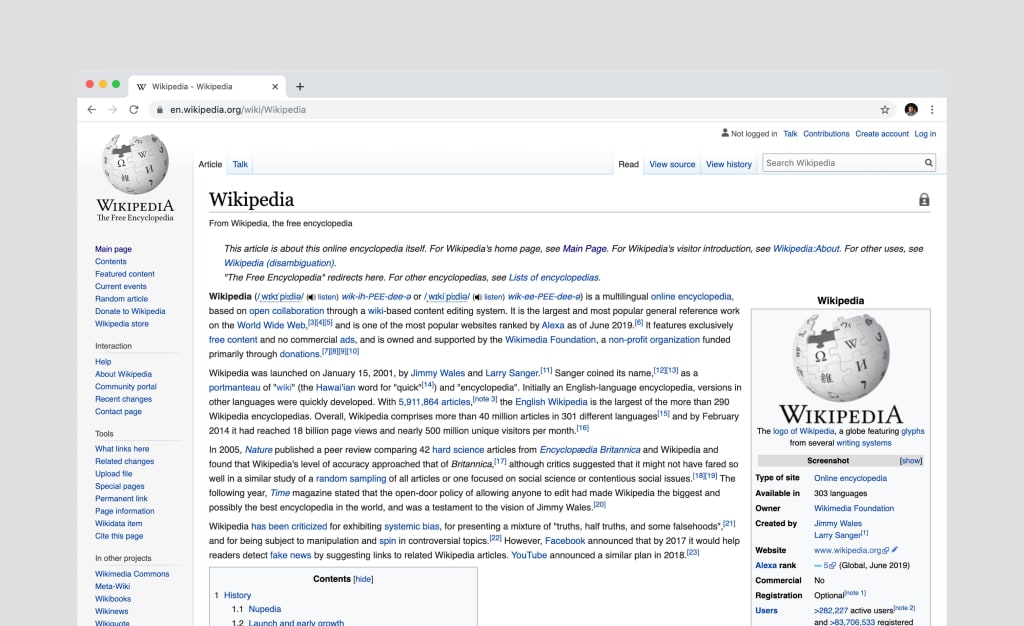Why You Should be Using Wikipedia for Research
A Guide to Using Wikipedia Academically.

We all know that teachers hate Wikipedia.com. Hate might be a strong word, but educators definitely try to steer students away from Wikipedia. We’ve been taught since elementary school to use sites with domains such as “.edu”, “.org”, but never “.com” when doing research. The teachers have a point. Sites with the domain “.com” are usually not professional or academic websites, and so would not be legitimate or credible for citation. However, just because these sites are not in and of themselves academic sources, does not mean they aren’t useful for research. This holds especially true for sites like Wikipedia. One simply has to learn how to use Wikipedia the right way.
Wikipedia is educational and informative, but not citable as its articles can often be written and edited by laypeople (this is not always the case — I myself had a history teacher who often edited Wikipedia). So how are the actual Wikipedia articles useful? Wikipedia articles are usually very carefully and academically written, but also written in simpler language than most scholars use in order that it be accessible to everyone of most education levels. Therefore, they are excellent for giving you the overview and background of a subject. Doing a paper on the Boston Tea Party but not exactly sure what went down? Go to Wikipedia’s article on it and familiarize yourself! Teacher telling you to research Julius Caesar but you don’t know what he did? Wikipedia will give you the important details! Reading the articles will give you a starting point for your research, and can even help you to narrow down what you want to discuss. At this point you will be looking for appropriate sources to use. This is where the other aspects of Wikipedia become useful.
Wikipedia uses and cites tons of sources, and almost all of them are academic or professional. What does this mean for you? It means you will never be without good sources! The trick is knowing where to look for them. In a long article, almost every paragraph (maybe even every other sentence or more) is cited with a footnote, as pictured below in this article about Julius Caesar:

Clicking on the footnote will take you to its corresponding number at the bottom of the page, under the section titled “References”, next to which is a scholarly source:

If you know what you’re looking for, you also have the option of skipping the footnotes altogether and just going straight to these citations. These sources are usually books or journal articles, or even, as in this case, citations from ancient texts. You will notice a little arrow icon next to most of these sources that looks like this:

By clicking on this icon, you will open a link either of the direct text that is being cited, or a link of how to access the text (Google Books is a popular link). Note that not all of the sources cited will have the most up-to-date information, but this does not indicate a lost cause or a dead end! You can read the topics of these sources to get an understanding of the methods of research used and what interests scholars, and move on from there using keywords from such sources to find more updated works.
I would like to note as well that just because a sentence in Wikipedia has a footnote with a source does not mean you can quote directly from Wikipedia and then cite the outside source. The reason I note this is because once you find the source you need, you must read the source for the proper information. This then begs the question: should you cite Wikipedia at all? The answer is: no. While Wikipedia has led you to the scholarly source, it is not actually the source, and so cannot be cited for the information found in the source.
Wikipedia is such a wonderful (and free!) resource — use it to enrich your learning and research, and to discover other, wonderful work done in the field. There is also the bonus of impressing your teachers with all of the in-depth research you’ve just done!
~~~~~~~~
Also published on my Medium publication, The Academia Arena.
About the Creator
Abby Siegel
Currently a grad student in classics researching Latin poetry as well as myth and folklore. I write poetry most of the time, and I am working on my first poetry collection. I also write book reviews and other blog pieces.






Comments
There are no comments for this story
Be the first to respond and start the conversation.